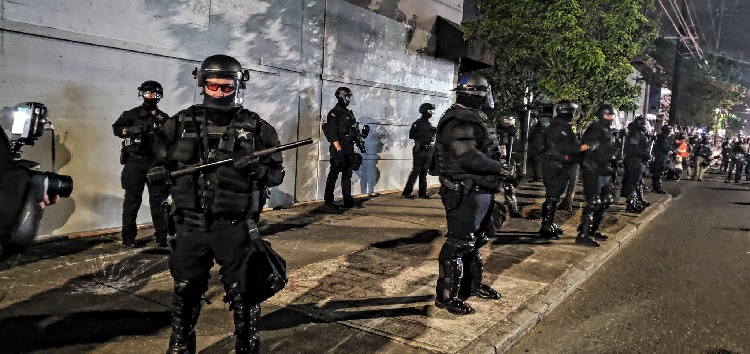Cover Photo By Mac Smiff
The police union enjoys veto power over any program that deals with public safety in the city.
In a revealing turn of phrase, a recent OPB headline read that “Portland mayor calls for faster roll-out of policing alternative.” OPB was covering a public letter the mayor sent Jo Ann Hardesty, who has been given responsibility over the Portland Street Response pilot program, which sends non-armed first responders to emergency calls related to people experiencing homelessness. In the letter, the mayor calls on Hardesty to speed up implementation of the pilot.
However, the public is not being told the full structural context surrounding the City’s power to implement policing alternatives.
The City of Portland’s contract with the Portland Police Association (PPA), the organization that represents the employees of the Portland Police Bureau (PPB), governs the program.
“Under labor law,” Hardesty explains on the City of Portland website, “once a union group has done certain work for years, then it is often considered bargaining unit work. If correct, then this means that the City cannot have someone else do the work without bargaining it to an agreement.”
Currently, the PPA enjoys grandfathered veto power over any policing alternatives, including the program.
Under the City’s current contract with the police union, PPA enjoys rights to—and power over—all possible programs that handle public safety in the city. That means the City’s power to offer an alternative to PPB services hinges on its contract with the PPA.
A June 2020 agreement between the City and PPA, which extended the PPA contract, made this crystal clear. “The PPA,” the agreement reads, “retains its collective bargaining rights over any implementation of the Portland Street Response program beyond the pilot program.”
Hardesty was grateful for the PPA’s decision to permit the pilot program. “Most importantly to me,” wrote Hardesty, following the contract extension, “the agreement allows the Portland Street Response pilot program to move forward with an expanded six teams.” The key word here is “allowed.” The power lies with the PPA and the union contract.
So, when Ted Wheeler writes a public letter to Hardesty “calling” on her to speed up the program, he deceives the public by ignoring the PPA’s power over the program. “I am grateful for your commitment to Portland Street Response,” Wheeler wrote to Hardesty. “I ask that in your continued role as Commissioner-in-Charge of Portland Fire & Rescue, and chief sponsor of the new program, you find ways to move more quickly toward implementation.”
Nowhere in Wheeler’s letter does he mention the power of the PPA contract over the program, nor his role in defending the PPA’s power.
If Wheeler really wanted to see a meaningful alternative to the PPB’s armed officers, he would push against the PPA’s control over the program. He would be focusing public attention on the PPA contract (up for renewal in June 2021)—not Hardesty’s limited power to implement the pilot program.

